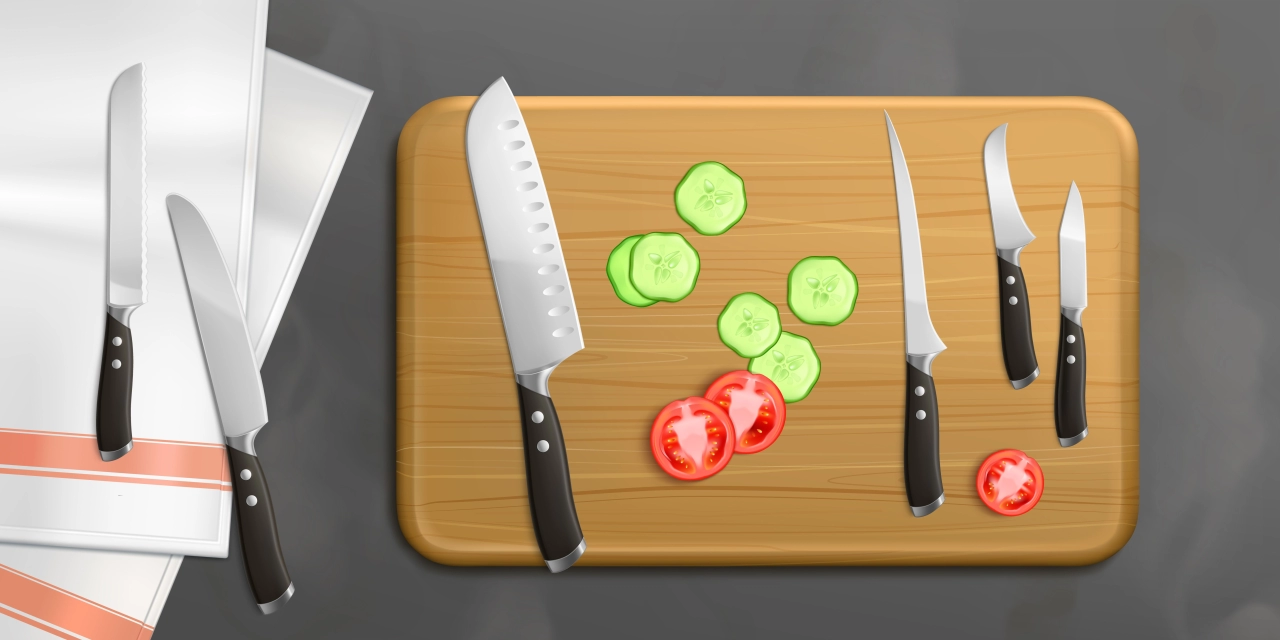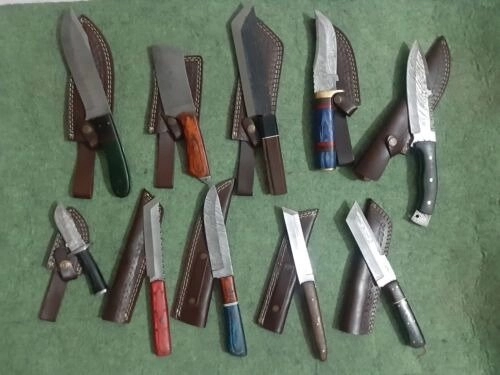In the culinary world and the great outdoors, having the right tools can make all the difference. Knives are essential instruments that serve a myriad of purposes, from dicing vegetables in the kitchen to skinning games during a hunting trip. To help you navigate the diverse world of blades, we've compiled a list of the top 10 types of knives suitable for both kitchen and hunting enthusiasts. Each knife has its unique characteristics and best use cases, making them indispensable tools for various tasks. The chef's knife is a versatile workhorse in the kitchen. Its wide, sharp blade makes it ideal for chopping, slicing, and dicing fruits, vegetables, and meats with precision. A paring knife is smaller and lighter, perfect for intricate tasks like peeling, trimming, and creating intricate garnishes. With a serrated edge, the bread knife excels at cleanly slicing through loaves of bread without crushing them, thanks to its saw-like teeth. Designed for deboning meat and poultry, the boning knife's narrow, flexible blade allows for precise cuts close to the bone. The utility knife strikes a balance between the chef's knife and the paring knife, making it versatile for various kitchen tasks. Fillet knives are essential for anglers, as they provide the flexibility needed to fillet fish with precision, removing bones and skin effortlessly. The Santoku knife is a Japanese all-purpose blade, perfect for slicing, dicing, and chopping with ease due to its sharp, Granton edge. Cleavers are robust, heavy-duty knives suitable for chopping through bones and hard vegetables, making them indispensable for butchers and hunters. When it comes to hunting, a skinning knife is crucial for cleaning and efficiently removing the hide from game animals. Hunters and survivalists often turn to the Bowie knife for its versatility in outdoor scenarios, as it can be used for both hunting and general campsite tasks. The chef's knife typically ranges in size from 6 to 10 inches, with an ergonomic handle and a broad, curved blade. Its versatility makes it a staple in every kitchen, allowing you to handle various cutting tasks with ease. From chopping vegetables to slicing meat, the chef's knife is a must-have for any aspiring home cook or professional chef. Paring knives are small and nimble, with a blade length of 3 to 4 inches. They excel at intricate tasks that require precision, such as peeling, trimming, and creating decorative garnishes. A good paring knife is an indispensable tool for making your dishes visually appealing. A bread knife features a serrated edge that effortlessly slices through crusty bread without squishing it. Its long, serrated blade ensures clean, uniform slices, making it an essential tool for bread lovers and bakers. Boning knives have narrow, flexible blades that make them perfect for removing bones from meat or poultry. The flexibility of the blade allows you to navigate around bones with precision, ensuring you get the most meat out of your cuts. The utility knife is a versatile option that falls between the chef's knife and the paring knife. Its moderate size and sharp edge make it suitable for various kitchen tasks, from slicing sandwiches to cutting cheese. For anglers and seafood lovers, a fillet knife is indispensable. Its thin, flexible blade is designed to remove bones and skin from fish, ensuring you can enjoy a boneless fillet with ease. The Santoku knife, originating from Japan, is a popular all-purpose knife with a shorter, granton-edge blade. It excels at slicing, dicing, and chopping, making it a favorite among home cooks and professional chefs alike. Cleavers are hefty knives with thick, rectangular blades, often used in butcher shops and professional kitchens. Their weight and strength make them perfect for chopping through bones and tough vegetables. Hunters rely on skinning knives to efficiently remove the hide from game animals. These knives feature a curved, sharp blade that makes the skinning process quick and precise. The Bowie knife, known for its distinctive blade shape, is a versatile tool for outdoor enthusiasts. Whether you're hunting, camping, or surviving in the wilderness, a Bowie knife can assist with a wide range of tasks. In conclusion, the world of knives offers a diverse array of options to suit both kitchen and hunting needs. Each knife type has its unique characteristics, making it essential for specific tasks. By choosing the right knife for the job, you can enhance your culinary skills and outdoor experiences. The chef's knife is the best all-around option for general kitchen tasks. A fillet knife is the ideal choice for filleting fish, thanks to its thin, flexible blade. While a bread knife is designed for bread, its serrated edge can also be handy for slicing soft vegetables like tomatoes. Cleavers are primarily used for chopping through bones and hard vegetables in professional kitchens. The Bowie knife's versatility makes it invaluable for various outdoor tasks, from hunting to survival situations.
10 Types of Kitchen Knives:
1. Chef's Knife
2. Paring Knife
3. Bread Knife
4. Boning Knife
5. Utility Knife
6. Fillet Knife
7. Santoku Knife
8. Cleaver
9. Skinning Knife
10. Bowie Knife

10 Types of Hunting Knives:
1. Chef's Knife
2. Paring Knife
3. Bread Knife
4. Boning Knife
5. Utility Knife
6. Fillet Knife
7. Santoku Knife
8. Cleaver
9. Skinning Knife
10. Bowie Knife
Conclusion
FAQs
What is the best knife for general kitchen use?
Which knife should I choose for filleting fish?
Can a bread knife be used for slicing vegetables too?
What is the primary purpose of a cleaver?
Why is the Bowie knife a popular choice for outdoor enthusiasts?